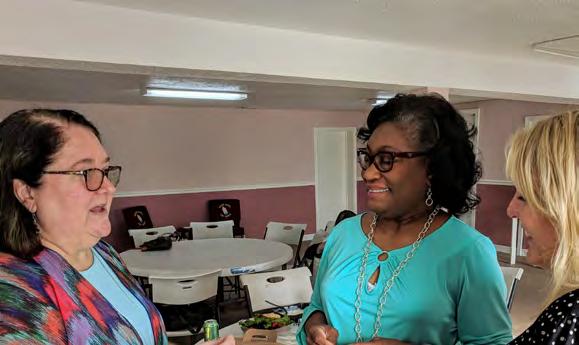
3 minute read
LEICESTER, UK
EQUIPPING SPORTS CLUBS TO TAKE THE LEAD IN PROMOTING HEALTHY LIFESTYLES IN THEIR COMMUNITIES
70-year-old Jashoda Patel was overweight, depressed and in danger of developing diabetes-related complications when she joined the 12-week Healthy Goals programme run by Leicester City in the community. Now she is happier and healthier, having been motivated to lose weight and make healthy lifestyle changes. Jashoda is managing her type 2 diabetes better and is even taking part in new activities, such as boxing, and making new friends in the process.
TARGETING COMMUNITIES THAT ARE OFTEN HARD TO REACH' OR SYSTEMATICALLY OVERLOOKED
Jashoda belongs to a community that is often described as hard to reach, but Cities Changing Diabetes in Leicester is doing its best to change that misconception. An ethnically and culturally diverse city, Leicester has a large population of people of South Asian descent who are at high risk of developing type 2 diabetes. By developing health interventions that are culturally relevant and located within minority communities, Cities Changing Diabetes has enabled more organisations to engage with more at-risk populations.
The Cities Changing Diabetes initiative is led by Leicester Diabetes Centre, a worldrenowned research facility at the interface between University Hospitals of Leicester NHS Trust and the University of Leicester. When Leicester joined the Cities Changing Diabetes programme in 2017, the team had access to a significant amount of research and medical data. Collating all these data enabled them to identify key focus areas. In an attempt to engage with previously overlooked communities, the Cities Changing Diabetes team set up a partnership with local professional sports clubs, building on existing networks. These popular clubs have well-established links with the people of Leicester. Working with the Cities Changing Diabetes team, they helped to deliver prevention programmes to a broader range of communities.
THE DIABETES PLEDGE – UNITING SPORTS CLUBS AND THE CITY COUNCIL AROUND A COMMON HEALTH GOAL
The Diabetes Pledge, an initiative instigated under the Cities Changing Diabetes umbrella, has been signed by professional sports clubs and Leicester City Council, demonstrating their commitment to working in partnership to drive down type 2 diabetes in Leicester. This goal is being achieved by promoting physical activity and healthy eating within the communities where the sports clubs are located and by ensuring their health and well-being programmes are accessible, inclusive and, where possible, tailored. This has led to the creation of a number of health promotion programmes, including Walking Cricket (where participants receive coaching in cricket skills and play games of walking cricket), Healthy Goals (an education and physical activity programme) and United Leicester (a pilot health promotion programme in primary schools).
The Cities Changing Diabetes team has played an important role in ensuring that the interventions are based on evidence, that evaluation data are collected and that those leading the programmes have been trained to deliver them appropriately. Moving forward, the focus will be to ensure sustainability by identifying funding streams, applying for grants and training more community volunteers to extend the reach of these programmes.
IN LEICESTER 9%
OF ADULTS ARE LIVING WITH DIABETES (HIGHER THAN THE PREVALENCE IN ENGLAND OF 6.9%)50
37.7%
OF CHILDREN AGED 10–11 ARE OVERWEIGHT OR ARE LIVING WITH OBESITY50
LOCAL PROGRAMME PARTNERS
Leicester Diabetes Centre Leicester City Council Leicester City Football Club Leicester Riders Basketball Club Leicester Tigers Rugby Club Leicestershire County Cricket Club
“The ability to reverse the rising tide of type 2 diabetes in Leicester cannot be achieved by any single intervention or organisation. Diabetes prevention in Leicester is recognised as a 'team sport' and, under the umbrella of the Cities Changing Diabetes initiative, partner organisations have been working collaboratively to tangibly reduce the impact of diabetes amongst our citizens.”











